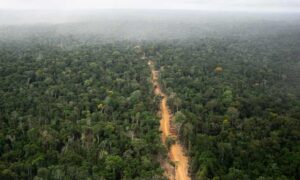
Five of the world’s biggest banks are “greenwashing” their role in the destruction of the Amazon, according to a report that indicates that their environmental and social guidelines fail to cover more than 70% of the rainforest.
The institutions are alleged to have provided billions of dollars of finance to oil and gas companies involved in projects that are impacting the Amazon, destabilising the climate or impinging on the land and livelihoods of Indigenous peoples.
The banks say they follow ethical policies that help to protect intact forests, biodiversity hotspots, indigenous territories and nature reserves. However, the investigation says it has found geographical and technical limitations on their ability to monitor and achieve these stated goals.
The report was produced by the watchdog organisation Stand.earth and the Coordinating Body of Indigenous Organizations of the Amazon Basin (COICA). The organisations mapped the extent of the environmental and social governance (ESG) commitments of five leading funders of fossil fuel operators in the South American biome. Those banks – Citibank, JPMorgan Chase, Itaú Unibanco, Santander and Bank of America – together account for more than half of the loans to companies in this sector.
The analysis found that on average, 71% of the Amazon is not effectively protected by the five banks’ risk management policies for climate change, biodiversity, forest cover, and Indigenous peoples’ and local communities’ rights.
The gaps ranged significantly from company to company. At one end of the spectrum is JPMorgan Chase, whose biodiversity protections, the report’s authors say, apply only to Unesco world heritage sites that cover just 2% of the Amazon and are, in any case, unlikely to be considered for oil and gas exploration.
On the positive side, the study commended the British bank HSBC, which was once a major funder of destructive projects in the region but has not provided any financing since it adopted a 100% Amazon exclusion policy in December 2022.
